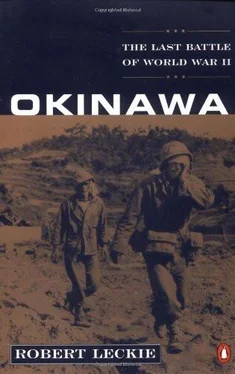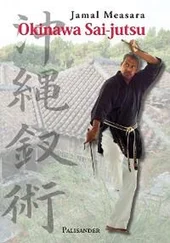Such a possibility might indeed have inhabited the minds of these mystical Japanese generals and admirals, men who actually did believe that the soul of a Samurai killed fighting for the emperor would dwell eternally in Yasakuni Shrine in Tokyo. But from the standpoint of reality, a more hopeful savior than either the traditionalist Ushijima or the fiery Cho existed in the person of Colonel Hiromichi Yahara, chief planning officer of the Thirty-second Army.
At forty-two Yahara was much younger than either Ushijima or Cho, although his record was almost as impressive. Graduated from the Japanese Military Academy in the class of 1923, Yahara had served in an infantry regiment, had attended the Japanese War College and spent ten months at Fort Moultrie in the United States as an exchange officer. He had also served with distinction during fighting in China, Thailand, Malaya, and Burma. Tall for a Japanese, poised, patrician, an intellectual, there was about him a kind of superciliousness—probably born of his contempt for those advocates of bamboo-spear tactics—that alienated many of his comrades. Especially Cho. Indeed, Cho and Yahara were as antithetical as two men could be. Where Cho was impetuous, Yahara was deliberate; where Cho was physical and aggressive, Yahara was thoughtful and careful; and where Cho was all heart, Yahara was all head. To Yahara war was not a contest but a science, to be won by superior tactics adjusted to terrain, weapons, and troops, not by those wretchedly bloody Banzai charges. In this intellectualism and the aloofness issuing from it, and in his unconcealed contempt for others who did not share his acumen, he again offended fellow officers on Ushijima’s staff.
Nevertheless Hiromichi Yahara’s rationalism was the perfect complement to Ushijima’s magnetism and Cho’s fire, thus conferring on the Thirty-second Army a superb leadership, which—now devoted to the new tactic of defense in depth to be executed on the most compatible terrain imaginable—did not presage a quick and easy victory for the American invaders. This trio’s intention to give up no ground willingly and to whittle and weary the enemy was reflected in the Thirty-second Army’s slogan composed by Ushijima:
One Plane for One Warship
One Boat for One Ship
One Man for Ten of the Enemy or One Tank
Fulfillment of the first slogan was up to the kamikaze, for General Ushijima had little airpower based on Okinawa’s five airfields.
“One Boat for One Ship” would be the objective by nautical Divine Winds of the Sea Raiding Squadrons. They were enlisted youths fresh out of high school, trained to ram explosive-stuffed motorboats into American ships. There were about 700 suicide boats hidden in the Ryukyus, and approximately 350 were only about fifteen miles west of southern Okinawa in the islets of the Kerama-retto.
The third stricture was left to a force of about one hundred thousand men, of whom a fifth were conscripted from the Okinawan population. The bulk of these troops was concentrated in Okinawa’s southern third.
Here Ushijima began to build a line facing north like a broad arrowhead. Its point rested on the heights surrounding Shuri and Shuri Castle, the city and citadel of Okinawa’s ancient kings. Its flanks swept back to the sea on either side, through a jungle of ridges to the chief city of Naha on the left (to the west), through similar hills back to Yonabaru Airfield on the right. It was the Naha-Shuri-Yonabaru line. It held the bulk of Ushijima’s fighting men—the Sixty-second Division, which had served in China, the Twenty-fourth Division, and the Forty-fourth Independent Mixed Brigade. To its left, on Oroku Peninsula jutting into the sea west of Naha, were about thirty-five hundred Japanese sailors and seven thousand Japanese civilians under Vice Admiral Minoru Ota. Roughly three thousand soldiers of the Second Infantry Unit under Colonel Takehiko Udo held the wild, uninhabited northern half of Okinawa—that part that Ushijima, at the urging of Yahara, had chosen not to defend. Nor would Ushijima attempt to contest the Hagushi Beaches in west-central Okinawa. He would defend the Minatoga Beaches to the south because they were in the rear of his Naha-Shuri-Yonabaru line, but he would protect almost nothing north of that line, except, of course, its approaches. He would not even defend Yontan and Kadena Airfields to the east of the Hagushi Beaches. These would be wrecked the moment the Americans appeared by a special force drawn from the Boeitai, the Home Guard of about twenty thousand men whom Ushijima had ruthlessly called up from among the Okinawan males between twenty and forty. The wrecking crew was called the Bimbo Butai, or “Poor Detachment,” by those Japanese soldiers whose loathing of Okinawa and all things Okinawan had already become a problem to General Ushijima.
Conscription of the Boeitai had unwittingly led to one of the chief complaints among Ushijima’s soldiers: the lack of fresh vegetables. There hadn’t been enough adult males around to produce the normal vegetable crop that fall and winter, and Tokyo was shipping in bullets, not beans.
“I cannot bear having just a cup of rice for a meal with no side dishes at all,” a soldier wrote. “Our health will be ruined.”
The lament was raised frequently elsewhere, and Ushijima took account of it by urging his men to “display a more firm and resolute spirit, hold to the belief of positive victory, and always remember the spirit of martyrdom and of dying for the good of the country.”
By way of consolation, the general issued each man a pint and a half of sweet-potato brandy, proclaimed a temporary amnesty for drunkards, and promised another issue on April 29, 1945, when the Emperor Hirohito would become forty-four years old.
Cho came back from his visit to Tokyo in late January. He reported that Ushijima’s defense plans dovetailed with Imperial Headquarters strategy and that he had been able to dispel some doubts about the decision not to defend the Hagushi Beaches. Cho was also elated by a secret report he had seen concerning the kamikaze. The attacks by twenty-six of Admiral Ugaki’s six-plane units had brought about instantaneous sinking of one American battleship, six carriers, and thirty-four cruisers. Even the clearheaded Cho had been blown overboard by the Divine Wind. He got out an inspirational message for the Thirty-second Army’s top commanders. It said:
The brave ruddy-faced warriors with white silken scarves tied about their heads, at peace in their favorite planes, dash out spiritedly to the attack. The skies are slowly brightening.
But the skies were rather darkening with the airplanes of the American Fast Carrier Forces, which began striking the Great Loo Choo late that month. After the raid of January 22, a Japanese soldier wrote in his diary:
While some of the planes fly overhead and strafe, the big bastards fly over the airfield and drop bombs. The ferocity of the bombing is terrific. It really makes me furious. It is past three o’clock and the raid is still on. At six the last two planes brought the raid to a close. What the hell kind of bastards are they? Bomb from six to six!
They were “hard-nosed bastards,” these Americans, and there were more and bigger ones coming—toward both the Ryukyus and Japan, both by air and by sea. Naha was being pounded to rubble and the wolf packs of the American submarine service were littering the floor of the China Sea with sunken cargo vessels and drowned soldiers.
The most shocking loss of all occurred on June 29, 1944, when the U.S. submarine Sturgeon under Lieutenant Commander C. L. Murphy sent four torpedoes flashing into the side of the troop transport Toyama Maru, sending her to the bottom along with fifty-six hundred soldiers and most of her officers and crew.
Читать дальше










